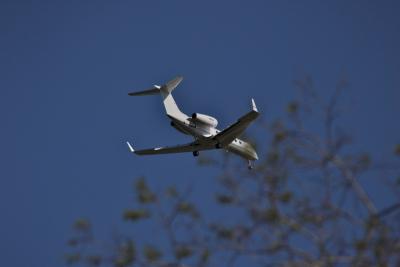Decision Delayed on East Hampton Airport Noise Rules

The planes will undoubtedly flow in tomorrow, bringing weekend visitors to East Hampton, and fly out after the weekend, also inevitably causing those under their flight paths and bothered by aircraft noise to once more become irritated and perhaps call a noise hotline to complain.
While a legal decision had been expected on whether three regulations that would restrict access to East Hampton Airport to reduce the impact of aircraft noise will come to bear, town officials announced Wednesday afternoon that the decision has been put off until June 26 at the request of Judge Joanna Seybert, who cited the complexities of the issue.
The East Hampton Town Board adopted laws in April establishing an overnight airport curfew and limiting types of aircraft deemed noisy, such as many helicopters, to one takeoff and landing per week during the summer season and extended curfew hours.
The restrictions, developed in response to ongoing outcries from hundreds of citizens across the East End — many of whom attended a forum on the issue last summer — were to be implemented by Memorial Day, but a lawsuit by aviation interests has kept them up in the air.
At a May 18 conference at United States District Court in Central Islip, Judge Seybert requested three weeks to make a determination regarding the issuance of a preliminary injunctionagainst the laws.
A United States attorney representing the Federal Aviation Administration, which was sued separately by the aviation group, also requested more time. The plaintiffs have asked that the two lawsuits be joined and reviewed together by the court.
While town officials worked for many months in conjunction with fact-finding committees and legal and engineering consultants to craft airport restrictions tailored to the noise problem here, and that they believe are allowable under federal aviation law, opponents charge that the restrictions fall outside of the town’s jurisdiction and of F.A.A. regulations, and will have a detrimental effect on business and the economy here.
An outright ban on helicopter use of the airport during the summer season was originally proposed, but then dropped.
The F.A.A.’s stance on how much authority East Hampton Town may exercise over operations at the airport — which must comply, overall, with federal guidelines — is central to the issue. In 2012 correspondence with former Representative Tim Bishop, the agency said that it would not challenge “reasonable restrictions” imposed by the town. But recently, the agency seems to have indicated it might reverse that stance by expressing support for the temporary restraining order affecting East Hampton’s new laws.
In response, Representative Lee Zeldin, who succeeded Mr. Bishop and is the vice chairman of the subcommittee on aviation, sent a letter to the F.A.A. expressing his disappointment and urging the agency to “stand by its assurances previously made in writing that the Town of East Hampton would not face negative action from the F.A.A. if they chose to enact reasonable restrictions, as long as the town agreed to not take any new F.A.A. funding.”
"The people of East Hampton, through their democratically elected town board,” Mr. Zeldin wrote, “have chosen this path because they believed the F.A.A. would stand by its word.”
The congressman said that he intends “to pursue what is necessary to hold the F.A.A. to its assurances and to work with all interested parties on an effective solution that reduces helicopter noise on the East End this high season and in the long term. Reaching a real solution is more important than politics or bureaucracy,” he said.
After the May 18 meeting with the judge, East Hampton Town Supervisor Larry Cantwell wrote his own letter to Senator Charles Schumer, expressing his concern about statements by Robert W. Schumacher II, the assistant United States attorney who attended the meeting on behalf of the F.A.A.
They indicated, Mr. Cantwell said, that “the F.A.A. is reneging on its legal interpretation expressed in writing to former U.S. Congressman Tim Bishop.”
“The assistant U.S. attorney and F.A.A. officials said in court this week that the F.A.A. disagrees with the import and legal effect of the agency’s position in its response to Congress,” Mr. Cantwell told Senator Schumer.
The supervisor made an urgent request that Mr. Schumer “write to the F.A.A. to encourage it to respect the clear advice it outlined in its 2012 letter to Mr. Bishop, advice that East Hampton has relied upon in enacting a set of local laws designed to curb aircraft noise impacts on residents across the East End of Long Island.”
